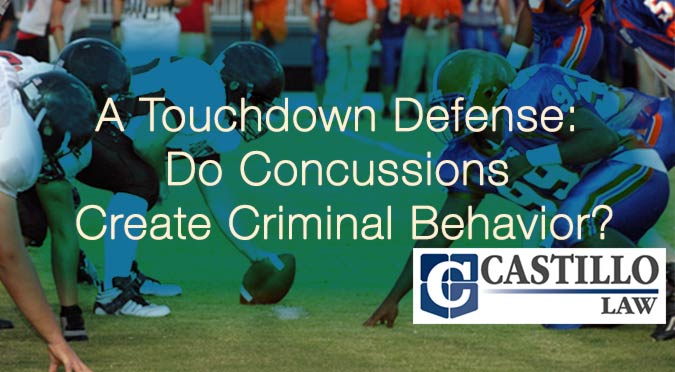While not everyone who suffers from concussions becomes a criminal, there is evidence in medical literature that shows how concussions cause behavioral changes. These changes include, impulsiveness, depression, aggression, inappropriate sexual behavior, lack of thought control and violence among people who, prior to their injuries, did not exhibit such behaviors. The question of how to apply these changes to criminal culpability and how much science can negate a person’s mens rea remains murky. The functions and workings of the brain cannot be reduced down to “this cause will always bring this result” type of thinking. The brain is the most complex part of the human body, and medical experts have not yet, and might not ever, understand it completely. What we know at this stage of the game is that concussion research is becoming much more steadfast thanks to the NFL player’s class action concussion lawsuit against the NFL. Due to this lawsuit, some NFL players might have paved the way for defense attorneys to argue Traumatic Brain Injury for Criminal Defense.
Concussions possibly linked to degenerative cognitive disease
Although concussions are only a small part of the reason the spotlight has been drawn on the NFL in the first two weeks of this year’s football season, the $765 million settlement reached in the class action concussion case raises some note-worthy questions for the Criminal Justice System. The 4,500 former NFL players filed this class action lawsuit based on the suspicion that the NFL conceals the dangers of concussions. According to the Center for Disease Control’s study of NFL players that specifically looked at Alzheimer’s, Amyotrophic Lateral Sclerosis and Parkinsons, one-third of retired players will develop some form of long-running cognitive problem in their life due to head injuries. They also found that approximately 35 percent of all NFL players will develop some type of degenerative cognitive disease like Alzheimer’s in their lifetime.
Concussions and Depression
While there is evidence that concussions can cause cognitive degeneration later in life, concussions can also have an immediate effect on someone as well. Many studies done on NFL players post-mortem try to explain the correlation between Traumatic Brain Injury and permanent changes of behavior. Andre Waters, a former NFL player, committed suicide in November 2011. Neuropathology suggests that the brain damage Andre faced from playing football led to his depression and untimely death. Andre was suffering from Alzheimers which appears to have been expedited by successive concussions, causing his 44 year old brain to have the degenerative characteristics of an 85 year old. Mike Webster, a former Steelers’ player, who suffered from brain dysfunction after a concussion, became homeless due to Depression, and Terry Long, suffering from the same symptoms, committed suicide in 2005. Due to the immediate and distant changes in someone’s behaviors and attitudes post-concussion, there is support for concussions changing someone’s life forever.
Challenges Explaining Concussions to a Jury
For a criminal defense attorney, it can be very hard to explain the inner workings of the brain to a jury at trial. Some call it the “Christmas Tree Effect,” where the jury gets excited by the pictures of the brain and discussion about the unknown limits of our own bodies. However, jurors hardly ever see much more than that because Traumatic Brain Injuries are so hard to explain and understand, even for the most successful and renowned medical professionals. The jury needs a detailed and simplified explanation of how brain injuries affect defendants in order to determine the extent of TBIs on culpability. The NFL concussion literature and studies are now a useful resource to pull from in case preparation for defendants who may have suffered TBIs.
Does this create a criminal loophole?
Unfortunately, there has been some resistance to the use of a brain injury defense in Criminal Cases. Stephen J. Morse, a professor of law and psychiatry at the University of Pennsylvania has long argued that brains don’t commit crimes. Neuroscientists like him feel that a neuroscientific defense will become the fallback. And, without caution the consensus among defense attorneys will be, “defendants have a weird quirk in their brain that makes them not responsible for their actions.”
Brain Injuries and Impulsive Behavior
While a concussion and a brain tumor are vastly different things, it is a fact that damage to the pathway between the orbitofrontal lobe and the amygdala can result in impulsive behavior, say organizations such as the MacArthur Foundation Research Network on Law and Neuroscience. The orbitofrontal lobe is a part of the brain that is involved in emotional responses and decision making. When you damage this area, Swerdlow states, “You don’t get the feedback that controls your decisions. You don’t have the brakes on your behavior.” Brain injuries are warranted and appropriate inclusions in criminal defense litigation and mitigation, as TBIs and brain related injuries could have directly led to the charges against the defendant. But, using neuroscience in court opens an academic debate about responsibility and free will and how attorneys evaluate scientific material. Twenty percent of trials where this evidence was introduced resulted in favorable outcomes for criminal defendants, according to Nita Farahany, a professor of law and genome science and policy at Duke University.
What do you think about Brain Injuries and Criminal Defense?
These inclusions become a question of competency and the extent of a defendant’s liability. Let us know what you think in a comment.
Castillo Law Phoenix is available 24/7 and we would be happy to take your call at 480-206-9386.

